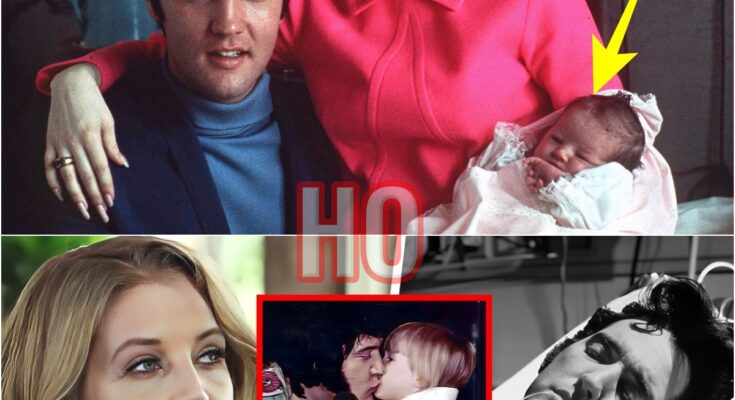Lisa Marie Presley, daughter of the King of Rock and Roll, Elvis Presley, has long lived in the shadow of her iconic father. Her life, marked by both extraordinary privilege and unimaginable pain, has been a subject of public fascination. Yet, it was only in her later years, particularly with the release of her posthumous memoir, that Lisa Marie has truly opened up about the complex and often difficult realities of growing up as the child of one of the most famous figures in the world.
:max_bytes(150000):strip_icc():focal(749x0:751x2)/Lisa-Marie-Presley-Dead-at-54-19680205_98-48e3f10608294560868c6e3f4b9b7e73.jpg)
In her memoir, Lisa Marie, now 54, reveals intimate details about her father that offer a new, more personal perspective on the man behind the music. The memoir offers a candid look at Elvis’s hidden struggles, his personal demons, and the toll that fame and addiction took on his health and relationships. It sheds light on the less glamorous side of the King’s life, which was often kept out of the public eye, particularly the emotional challenges that plagued both father and daughter.
The Burden of Fame
From a young age, Lisa Marie was acutely aware of the pressures that came with being Elvis Presley’s daughter. Graceland, the sprawling mansion that was her home, was more than just a house—it was the epicenter of Elvis’s fame. To the world, he was an icon, but to Lisa, he was simply her father. Her memoir reveals how she struggled to reconcile these two versions of him: the adoring father and the exhausted, drug-dependent superstar.
Lisa Marie often feared for her father’s health. As a child, she even wrote a poem expressing her concern, titled “I hope my Daddy doesn’t die,” a reflection of the dread she felt as she watched him spiral deeper into addiction. She knew that her father’s lifestyle was unsustainable, but at the time, she didn’t fully understand the extent of the pressures he was facing.
The Hidden Struggles of Elvis Presley
Elvis’s life was one of extreme highs and devastating lows. While he conquered the world with his music and charisma, privately, he struggled with intense personal issues. His rise to fame came with overwhelming demands and constant scrutiny, which he tried to cope with through prescription drug use. Initially, these drugs were prescribed to manage pain and anxiety, but they quickly led to dependency. Lisa Marie writes in her memoir about how she would frequently find her father in deteriorating states, sometimes having to catch him when he stumbled, unable to stay on his feet.
Elvis’s addiction began in the late 1960s and became more severe throughout the 1970s. His long-time physician, Dr. George Nicopoulos, played a major role in this tragic spiral. Dr. Nick, as he was known, supplied Elvis with thousands of doses of addictive drugs. His over-prescription of powerful medications fueled Elvis’s dependence, contributing to a range of health issues, including chronic constipation, diabetes, and glaucoma.
The strain of this lifestyle was evident to Lisa Marie, who watched her father deteriorate before her eyes. His once electrifying stage presence was dulled by his declining health, and he struggled with the effects of the drugs that kept him going. Lisa Marie recalls moments when she would watch him perform, mesmerized by his talent, but always haunted by the fear that his health would eventually betray him.
The Day Elvis Died
Lisa Marie was just 9 years old when Elvis Presley passed away on August 16, 1977. The day began like any other, but there was an eerie silence that filled the halls of Graceland. When Lisa woke up, her father was nowhere to be found. She went in search of him, only to discover the devastating truth. Elvis, her father, the King, had passed away in the bathroom of his home, the victim of a heart attack likely caused by years of prescription drug abuse.
In her memoir, Lisa Marie vividly recalls the moment she found her father, motionless on the floor. The scene left an indelible mark on her, a moment she would never be able to forget. As the news spread and the world mourned the loss of a cultural icon, Lisa Marie was left to grapple with the loss of her beloved father. The weight of grief was overwhelming, and Lisa Marie struggled to process the reality that her father, the man who had been larger than life, was gone.
Life After Elvis’s Death
The death of her father marked the beginning of a tumultuous period in Lisa Marie’s life. Her childhood innocence was shattered, and she found herself thrust into the public eye. The media’s relentless scrutiny compounded the grief, making it difficult for Lisa Marie to find any semblance of peace. She was just a young girl, but the expectations placed on her were enormous.

In the years following Elvis’s death, Lisa Marie’s relationship with her mother, Priscilla Presley, became strained. The emotional distance between mother and daughter only deepened, and Lisa Marie’s rebellious spirit led her to seek solace elsewhere. Her memoir describes her time living at the Scientology Celebrity Center during her teenage years, where she found a sense of community and belonging, albeit through unconventional means.
Despite the chaos in her personal life, Lisa Marie would go on to pursue her own career, trying to find her identity outside of her father’s shadow. She released her debut album, To Whom It May Concern, in 2003, a testament to her talent and determination to be recognized on her own terms. Yet, the legacy of Elvis Presley loomed large, and Lisa Marie struggled with the pressure of living up to his iconic status.
Addiction and Tragedy
Lisa Marie’s struggles with addiction mirrored her father’s, and she faced similar demons in her adult life. Following the birth of her twin daughters, Finley and Harper, in 2008, she was prescribed pain medication. What started as a prescription for relief quickly spiraled into an addiction. Lisa Marie described her experience with addiction as “withdrawing in the big leagues,” a sobering realization of how deeply entrenched she had become in substance abuse.
Her personal tragedy was compounded by the devastating loss of her son, Benjamin Keough, in 2020. At just 27 years old, Benjamin took his own life, leaving Lisa Marie broken. She described her son as the love of her life, and his passing was a blow from which she never truly recovered. In an extraordinary and heartbreaking act of grief, Lisa Marie kept Benjamin’s body in her home for two months after his death, unable to let go of him.
This profound loss, combined with the trauma of her past, led Lisa Marie to further struggle with her health and addiction. Yet, in the face of such overwhelming grief, she found strength in her children and in her journey toward sobriety. Lisa Marie’s story is a poignant reminder of the complexities of life, fame, and family. Her openness about her struggles has sparked important conversations about addiction, loss, and the human cost of living in the public eye.
Legacy and Reflection
At 54, Lisa Marie Presley continues to live with the legacy of her father’s fame, but her memoir provides a glimpse into the woman behind the name. In revealing the untold truth about Elvis, Lisa Marie not only shares her personal story but also offers a deeper understanding of the man who was, and still is, a symbol of American culture.
Through the lens of Lisa Marie’s life, we see the complexities of fame, the toll it takes on both the individual and their family, and the resilience required to navigate such immense public and private struggles. In her own way, Lisa Marie has come to terms with her father’s legacy, and through her memoir, she has created a powerful, heartfelt tribute to both the man and the father she lost too soon.




